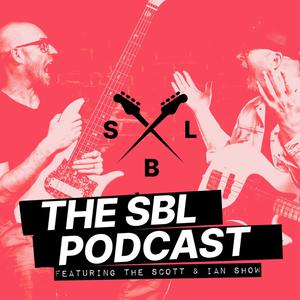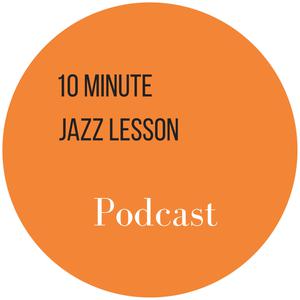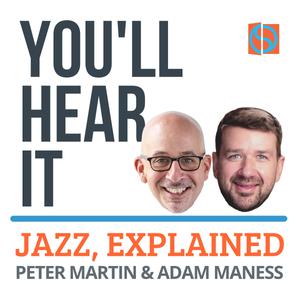
Learn Jazz Standards Podcast
Brent Vaartstra: Jazz Musician, Author, and Entrepreneur
The LJS Podcast is the podcast where you get weekly jazz tips, interviews, stories and advice for becoming a better jazz musician! Hosting the show is the jazz musician behind learnjazzstandards.com, author, and entrepreneur Brent Vaartstra, who’s one goal is to answer any question about playing jazz music you may have. Jazz can be a challenging music to learn and play, but it doesn’t have to be so hard. Each episode features a specific musical challenge that jazz students may come across, where it is discussed and answered. Special jazz guests frequent the show, sharing their expertise on an array of different musical subject matter. Listeners are invited to call in with their jazz questions to the podcast hotline, where it could get answered on a future LJS Podcast episode. Join thousands of other listeners getting free jazz education every week!
- 46 minutes 20 secondsSeason 2 Finale - 26 Top Tips For Playing Jazz
In this episode, Brent wraps up season two of the podcast with a special finale episode, reflecting on the journey and the changes implemented over the years. Originally starting in 2016, the podcast evolved from informal episodes to a structured season-based format in 2024, aiming to engage with listeners' questions. Throughout season two, Brent has provided invaluable insights and advice on various jazz topics. He encourages listeners to revisit past episodes to extract actionable knowledge and reflect on their learning journey.
In celebration of the season, Brent shares his top 26 tips for playing jazz, highlighting essential practices such as active listening, learning solos by ear, and focusing on instrument-specific techniques. He emphasizes the importance of listening deeply to jazz music to truly understand its language and the benefits of transcribing solos to enhance ear training and muscle memory. Brent also stresses the significance of practicing techniques tailored to individual instruments, ensuring that technical limitations do not hinder one's ability to express musical ideas.
Concluding the episode, Brent underscores the critical role of rhythm in jazz, the necessity of developing a strong ear, and the value of frequent improvisation. He advises listeners to study jazz harmony to gain a comprehensive understanding of chord progressions and to establish a strategic practice routine to avoid aimless noodling. Brent's tips provide a roadmap for continuous improvement, encouraging jazz enthusiasts to engage deeply with the music and cultivate their skills methodically.
Important Links:
Free Guide to learning standards by ear: Learn Jazz Standards the Smart Way
LJS Inner Circle Membership
Listen to the Learn Jazz Standards PodcastLearn Jazz Standards Inner Circle: Get 50% off your first month!
28 June 2024, 1:00 pm - 11 minutes 31 secondsShould Non-Bass Players Learn Bass Lines?
In this episode, Brent answers a question from Kevin Pritchett about the importance of bass lines for non-bass players. Kevin, a piano player, wonders if learning bass lines can benefit his playing and improvisation. Brent explains that understanding bass lines is valuable for all musicians, not just bass players because it helps in grasping chord tones, time feel, and melodic resolutions. He emphasizes that playing bass lines can enhance one's overall musicality and time-keeping skills.
Brent shares his personal experience of learning bass lines and how it helped him during his early gigs with a piano player. He discusses the importance of practicing quarter notes, which are foundational in jazz, and how bass players' focus on chord tones and rhythmic patterns can benefit other instrumentalists. Brent also highlights that learning bass lines can improve a musician's sense of pulse and time, essential for any jazz player, whether they are accompanying or soloing.
In addition to learning bass lines, Brent encourages musicians to explore solos and techniques from other instruments, broadening their musical perspective. He concludes by urging listeners to try learning a bass line, regardless of their primary instrument, to gain new insights and improve their jazz playing.
Important Links:
Free Guide to learning standards by ear: Learn Jazz Standards the Smart Way
LJS Inner Circle Membership
Listen to the Learn Jazz Standards PodcastLearn Jazz Standards Inner Circle: Get 50% off your first month!
27 June 2024, 1:00 pm - 15 minutes 23 secondsHow Do I Perform Solo?
Welcome to another episode where Brent answers your jazz and music questions five days a week. Today, we have an intriguing question from Ken Bryan from York, Pennsylvania, about resources and advice for a jazz guitarist aiming to perform solo at venues like bars, restaurants, and parties. Brent discusses this topic, sharing his personal experience and offering valuable tips for anyone looking to enhance their solo performance skills.
Brent emphasizes the importance of finding a solo guitar style that resonates with you. He recalls his college days and the profound influence of Peter Bernstein’s solo guitar performances at Smalls in New York. He suggests building a repertoire of songs with basic solo arrangements and practicing improvisation, focusing on telling an interesting musical story through single-note lines before integrating chords.
Additionally, Brent encourages solo performers to embrace their unique approach, even if it means using technology like loop pedals to enhance their sound. He also highlights the resources available in the Inner Circle membership, such as the jazz guitar and piano accelerator courses, which offer valuable tools for mastering solo performance. With consistent practice, learning jazz standards, and perhaps booking a performance to set a tangible goal, anyone can improve their solo playing skills.
Important Links:
Free Guide to learning standards by ear: Learn Jazz Standards the Smart Way
LJS Inner Circle Membership
Listen to the Learn Jazz Standards PodcastLearn Jazz Standards Inner Circle: Get 50% off your first month!
26 June 2024, 1:00 pm - 13 minutes 16 secondsHow Do I Know What To Practice?
In this episode, Michael, a piano player, asks how to efficiently allocate practice time to various topics like scales, voicings, improvisation, and more. Brent emphasizes the importance of focusing on the 20% of practice that yields 80% of the results, advising musicians to prioritize practicing what ails them the most or where they have the most potential.
Brent shares practical tips to identify strengths and weaknesses. He also introduces the concept of the three pillars of jazz improvisation. By focusing on these pillars, musicians can streamline their practice routine and ensure they're working on the most impactful areas.
Discover how to create a focused practice plan, avoid the myth of the perfect practice routine, and benefit from feedback loops and coaching. Brent's insights will help you practice smarter and achieve your musical goals faster. Don't miss out on this episode and enhance your jazz practice today!
Important Links:
Free Guide to learning standards by ear: Learn Jazz Standards the Smart Way
LJS Inner Circle Membership
Listen to the Learn Jazz Standards PodcastLearn Jazz Standards Inner Circle: Get 50% off your first month!
25 June 2024, 1:00 pm - 7 minutes 32 secondsHow Should Horn Players Play Together In a Jazz Band?
In this episode, Brent responds to a question from Louis Thompson about the lead instrument in a small jazz ensemble with a trumpet, saxophone, trombone, and rhythm section. Brent discusses the dynamics of horn players working together, exploring various approaches for melody and improvisation. He explains how horn players usually play in a jam session.
Brent emphasizes the importance of listening and adapting to each other’s playing to create a cohesive sound. Whether it’s harmonizing, creating counterpoint lines, or trading off the lead, there are numerous ways for horn players to collaborate and make the music shine.
Tune in to discover how multiple horn players can harmonize, create counterpoint lines, and share the spotlight in jazz performances. Brent's insights will help you better understand ensemble playing and enhance your jazz skills. Don't miss this episode and make sure to subscribe on Spotify or Apple Podcasts for more valuable tips and advice.
Important Links:
Free Guide to learning standards by ear: Learn Jazz Standards the Smart Way
LJS Inner Circle Membership
Listen to the Learn Jazz Standards PodcastLearn Jazz Standards Inner Circle: Get 50% off your first month!
24 June 2024, 1:00 pm - 13 minutes 19 secondsThe Importance of Your Practice Engine
In this episode, Brent explores a crucial topic: the practice engine. He highlights the importance of mastering the art of practicing, explaining that it's not just about following routines but treating practice as a skill in itself. This approach, he emphasizes, differentiates amateur musicians from advanced players and is essential for significant progress in jazz playing.
Brent illustrates his point by using the analogy of a car. Even with the best resources and tools, without a well-functioning practice engine, progress will stall. He provides insights into how you can optimize your practice routines to ensure effective learning and improvement. He also offers practical tips for developing a strong practice engine.
This episode is packed with valuable advice to help you transform your practice sessions and accelerate your jazz journey. Tune in to discover how to fine-tune your practice engine and make the most of your musical efforts.
Important Links:
Free Guide to learning standards by ear: Learn Jazz Standards the Smart Way
LJS Inner Circle Membership
Listen to the Learn Jazz Standards PodcastLearn Jazz Standards Inner Circle: Get 50% off your first month!
21 June 2024, 1:00 pm - 11 minutes 6 secondsCan I Work On Instrument Technique and Songs At The Same Time?
In this episode, Brent answers an insightful question from Robert Banagay about balancing technical proficiency with learning jazz standards. Robert, a musician returning to his instrument after a long hiatus, wonders if he can improve his technique while simultaneously diving into jazz tunes. Brent introduces the concept of the three pillars of jazz improvisation explaining how they interconnect and can be practiced together to enhance one's jazz playing.
Brent emphasizes that working on technique, whether it's instrument-specific or jazz-specific, doesn't have to be done in isolation. He uses the analogy of a pizza to illustrate how repertoire forms the crust, supporting everything else. This integrated approach allows musicians to practice technical skills and jazz language in a musical context, making the learning process more cohesive and effective.
Ultimately, Brent encourages listeners to jump into learning songs while addressing technical gaps as they arise. He shares wisdom from his own experience. This episode is a must-listen for anyone looking to refine their jazz skills and strike a balance between technical exercises and musical application. Tune in to gain valuable insights and take your jazz playing to the next level.
Important Links:
Free Guide to learning standards by ear: Learn Jazz Standards the Smart Way
LJS Inner Circle Membership
Listen to the Learn Jazz Standards PodcastLearn Jazz Standards Inner Circle: Get 50% off your first month!
20 June 2024, 1:00 pm - 8 minutes 59 secondsHow to Compose For a Jazz Group
In this episode, Brent tackles a fascinating question from Bruno Morelos about composing for a jazz band. Bruno wonders how professional jazz musicians handle compositions, especially when each band member has a solo. Brent explains that jazz compositions often involve creating a theme with melodies and harmonic foundations, allowing musicians to improvise freely.
Brent discusses how composers can incorporate specific elements while still giving musicians the freedom to add their own improvisational flair. He also highlights the balance between structured composition and the spirit of jazz, which thrives on improvisation and personal expression.
For those interested in jazz composition, this episode offers valuable insights into creating music that allows musicians to explore and inject their personality while maintaining the essence of the composition. Tune in to learn more about the art of jazz composition and get inspired to create your own musical masterpieces.
Important Links:
Free Guide to learning standards by ear: Learn Jazz Standards the Smart Way
LJS Inner Circle Membership
Listen to the Learn Jazz Standards PodcastLearn Jazz Standards Inner Circle: Get 50% off your first month!
19 June 2024, 1:00 pm - 10 minutes 2 secondsHow Do I Not Overthink When I Solo?
In this episode, Brent tackles a listener's question about avoiding overthinking during solos. Anton Visser, a long-time listener, asks how to play more intuitively without feeling compelled to fill every bar with notes. Brent advises that while it's important to practice and understand the theory, the key to natural-sounding solos is to let intuition and emotional connection to the music guide you. He compares this to the ease of tying your shoes, which becomes second nature through repetition and familiarity.
Brent also emphasizes the importance of practicing leaving space in solos and suggests exercises to help with this, like alternating between playing and resting bars. He encourages listeners to practice improvising freely, without backing tracks or strict adherence to chord changes, to build confidence in their musical instincts.
This episode is packed with practical tips and insights to help jazz musicians play more naturally and confidently. Don't miss out on this valuable advice—subscribe to the Learn Jazz Standards Podcast today and take your jazz journey to the next level.
Important Links:
Free Guide to learning standards by ear: Learn Jazz Standards the Smart Way
LJS Inner Circle Membership
Listen to the Learn Jazz Standards PodcastLearn Jazz Standards Inner Circle: Get 50% off your first month!
18 June 2024, 1:00 pm - 10 minutes 37 secondsHow Long Should My Jazz Solos Be?
In this episode, Brent addresses a great question from listener Mani Murray about the appropriate length of a solo in different musical settings. Brent emphasizes that a solo should last as long as it remains interesting and musically compelling. He discusses how to gauge when to end a solo, focusing on maintaining the quality of the music and avoiding the tendency to overplay.
Brent also shares practical tips for different scenarios, such as jam sessions and gigs, highlighting the importance of considering the context and etiquette when deciding the length of your solo. He explains that understanding when to end a solo, whether in a jam session with multiple players or during a dinner gig, is crucial for enhancing the overall musical experience.
By following these guidelines, musicians can ensure their solos contribute positively to the performance and respect the dynamics of the group. Tune in to the full episode for valuable insights on soloing and practical advice to enhance your jazz journey.
Important Links:
Free Guide to learning standards by ear: Learn Jazz Standards the Smart Way
LJS Inner Circle Membership
Listen to the Learn Jazz Standards PodcastLearn Jazz Standards Inner Circle: Get 50% off your first month!
17 June 2024, 1:00 pm - 16 minutes 28 secondsThe Worst Mistakes to Make At a Jazz Gig
In this Fast Track Friday episode, Brent discusses the common pitfalls musicians face when preparing for and performing at jazz gigs. Drawing from his extensive experience, he offers invaluable advice to ensure you’re fully prepared and professional, such as the importance of being over-prepared, arriving early, and ensuring you have all your necessary gear. These foundational tips are crucial for setting yourself up for success and avoiding stressful, last-minute scrambles.
Whether it's controlling your volume to suit the venue or avoiding selfish playing that overshadows your bandmates, Brent suggests that understanding your role in the performance is key. He shares anecdotes to illustrate these points, highlighting the significance of making the gig enjoyable not just for yourself but for your audience and fellow performers as well.
Finally, Brent touches on maintaining professionalism during gigs, such as managing alcohol consumption and adhering to appropriate break lengths. He stresses the impact of your demeanor on the audience and the importance of maintaining a positive and professional attitude, even when mistakes happen. This episode is packed with practical tips and insights that can help any jazz musician elevate their gig experience, making it a must-listen for those looking to improve their live performance skills.
Important Links:
Free Guide to learning standards by ear: Learn Jazz Standards the Smart Way
LJS Inner Circle Membership
Listen to the Learn Jazz Standards PodcastLearn Jazz Standards Inner Circle: Get 50% off your first month!
14 June 2024, 1:00 pm - More Episodes? Get the App
Your feedback is valuable to us. Should you encounter any bugs, glitches, lack of functionality or other problems, please email us on [email protected] or join Moon.FM Telegram Group where you can talk directly to the dev team who are happy to answer any queries.
 No Guitar Is Safe
No Guitar Is Safe
 The SBL Podcast
The SBL Podcast
 The 10 Minute Jazz Lesson Podcast
The 10 Minute Jazz Lesson Podcast
 You'll Hear It
You'll Hear It
 Wong Notes
Wong Notes
 Chewing the Gristle with Greg Koch
Chewing the Gristle with Greg Koch